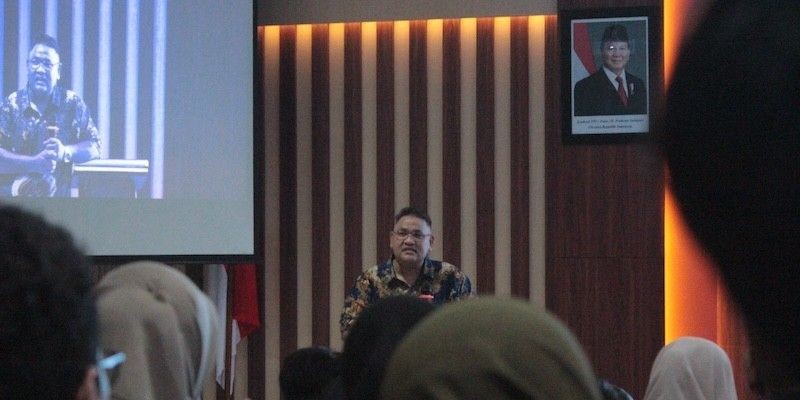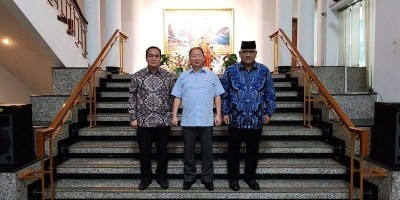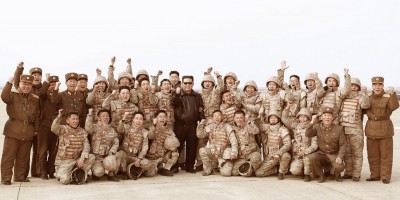Teguh Santosa: Long-term Peace Guaranteed by Balanced Power

Peace is a period between two wars that can be long or short depending on the strength of the warring parties. If the strength of the warring parties is relatively equal or balanced, the period of peace can be expected to last relatively long.
However, if the strength of the warring parties is not balanced, it is likely that the stronger party will conquer the weaker party.
From this realist perspective, the power possessed by each country in the international arena also plays an important role in determining, creating, and maintaining peace.
This was said by an international relations observer, DR. Teguh Santosa, when giving a public lecture on the conflict on the Korean Peninsula in the Sebelas Maret University (UNS), Solo, Friday afternoon, November 1, 2024.
In a presentation entitled "Two Koreas: A Two-Level Game, Two Wars?" Masters degree holder from University of Hawaii at Manoa (UHM) and doctoral degree holder from Padjadjaran University (Unpad) reveals the story of the Korean Peninsula conflict and the logic of two-level games postulated by Robert D. Putnam in elaborating the foreign policy taken by a country.
The logic of the two-level game examines that the foreign policy of each country is influenced by the dynamics of national politics and political constellations in the international arena.
In addition, by using the realism postulate offered by Hans J. Morgenthau, Teguh who also leads the Indonesian Cyber Media Network (JMSI) explains that in the anarchic international arena, every country wants to be safe.
"The general theory on this matter says that security is a situation where defense is greater than threats. North Korea's efforts to increase military capacity and reach military agreements with their allies are based on this calculation. North Korea feels that it is in the midst of a real threat, in the form of the military power of the United States in East Asia, especially in Japan and South Korea," said the Director of Information Bureau of the Asia Pacific Regional Committee for Friendship and Solidarity with Korean People (APRCFSKP).
He continued, the way to reduce tensions in the region is to significantly reduce the source of the tension. This means that the United States and its allies in the region must reduce pressure on North Korea, so that North Korea is not encouraged to increase military capacity and increase cooperation with their closest countries, in this case Russia.
Question on Korean Reunification
Another thing discussed in the public lecture was the opportunity for reunification of the two Koreas which was open in 2018-2019 but returned to a dead end after the regime change in South Korea and the United States.
According to Teguh, by removing the reunification of the Korean Peninsula from the Constitution, North Korea is essentially offering a new approach to ending the conflict. This approach is a kind of new two-state solution, where each Korea becomes its own country that can live side by side peacefully (peaceful coexistence).
"To create a peaceful coexistence situation, the armistice agreement that ended the Korean War in 1953 can be changed into a peace treaty between the two countries. After that, the two countries can establish relations as two independent and friendly countries. Or in other words, change negative peace into positive peace," said Teguh again.
However, the problem is that South Korea is reluctant to follow North Korea's steps. Meanwhile, the South Korean Constitution states that the territory of the Republic of Korea (South Korea) includes the entire Korean Peninsula and the small islands around it.
After North Korea removed the idea of reunification from their national narrative, South Korea instead increased the pressure. North Korea also gave an equivalent response by pressing back on South Korea.
Teguh hopes that more and more world citizens will see the preservation of Korea using a clearer perspective and oriented towards creating lasting peace in the region. Fully aware, he said, increasing tensions and even erupting into open armed conflict can disrupt regional security and stability and will have a very serious impact on all countries in the region, including Indonesia.
At the end of the public lecture led by UNS FISIP international relations lecturer Muchnizar Siagian, Teguh handed over two books containing a collection of interviews with ambassadors of friendly countries that he had written to selected students.
The two books entitled “Bad Peace, Good War” and “Buldozer from Palestine” have been recorded by the Indonesian World Record Museum (MURI) as the book with the most interviews with ambassadors of friendly countries. 



